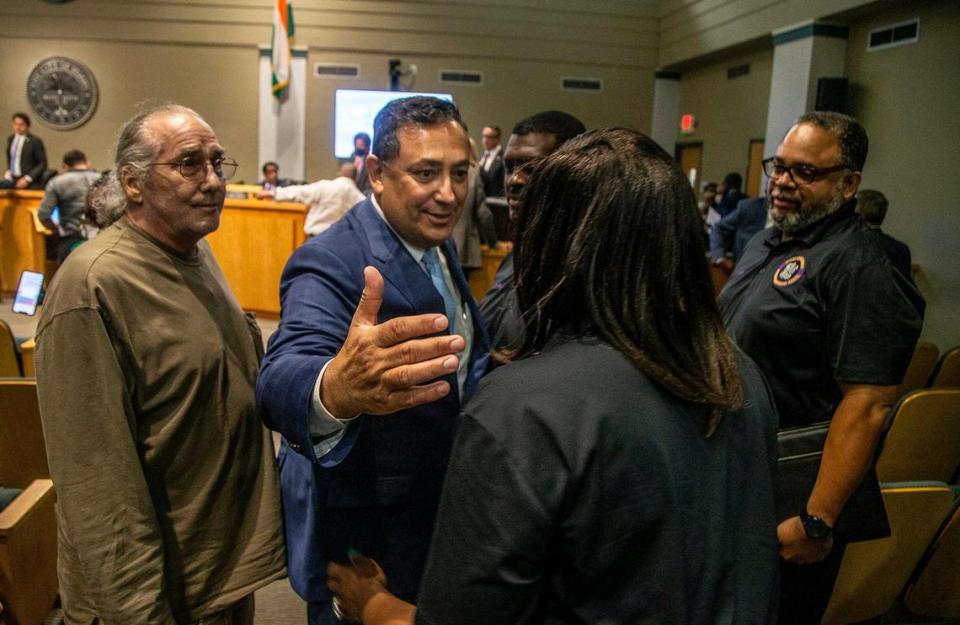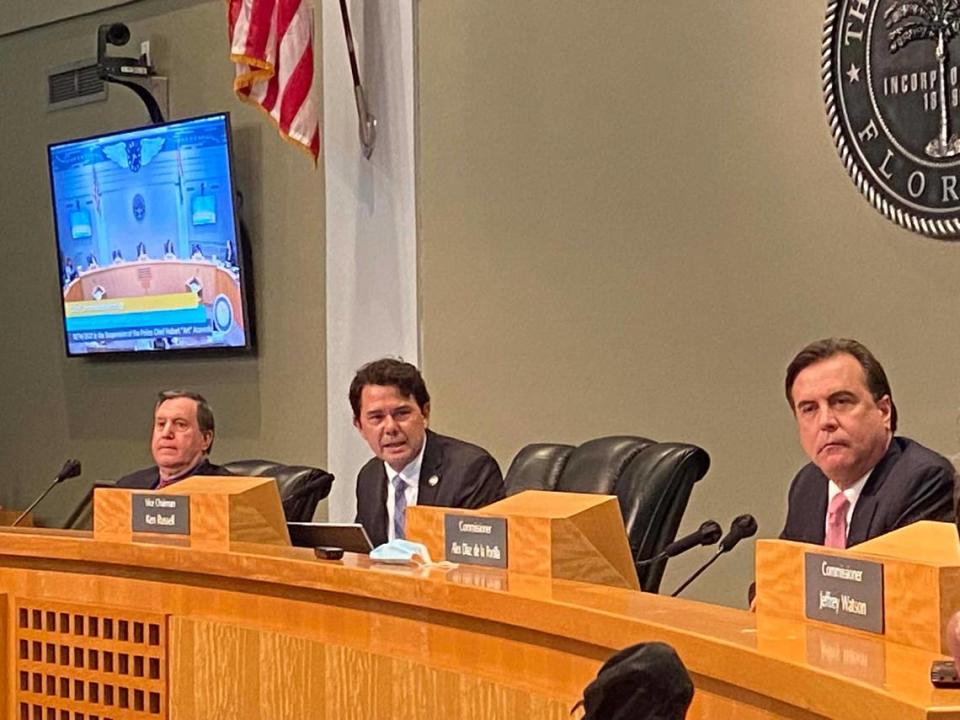Miami leaders, cowed by one sector of the Cuban community, prove Chief Acevedo right | Opinion
- Oops!Something went wrong.Please try again later.
The only-in-Miami trial to fire Police Chief Art Acevedo is one for the books.
The outcome, his ouster, was preordained.
After a 4 1/2-hour, quasi-judicial proceeding Friday at City Hall — where Miami city commissioners tried to behave with decorum but once again failed — the short tenure of the celebrity police chief ended with his official firing.
No surprise there, but the revelations that came out of the process matter.
They say a lot about the state of the Independent Republic of Miami.
The chief’s six-month rocky run and firing have exposed the fault lines of a city government that caters only to one sector of the diverse Cuban community, the right-wing one, fading before Trumpism but now recharged.
The imbroglio also has entered into evidence a seedy city government that allows one perennial troublemaker, Commissioner Joe Carollo, to turn his personal vendettas into the agenda for the way the city does business.
Winners and losers — including you, Mr. Mayor — abound in the ouster of Miami police chief | Opinion
Some highlights and takeaways from the final dramedy:
The vulgar, unbalanced Carollo stood in judgment of vulgarity by a subordinate the chief is alleged to have failed to castigate. Ha.
The brass vying for Acevedo’s job before he was hired were the top witnesses testifying against him, among other things, for not entering his time off in the time-keeping system — when they don’t enter theirs, either.
Their clerks do it, as Acevedo’s assistant was supposed to do as well, but apparently didn’t.
Such previously unknown yet enlightening details — and the bigger issue that this is the culture Acevedo walked into — were swept under the table, as the attorney for Miami City Manager Art Noriega moved through the eight reasons Acevedo was being fired.
Feds should investigate Miami police chief’s allegations of City Hall corruption | Opinion
Sensitivity only to ‘Cuban mafia’
All the time spent coming back to Acevedo’s “Cuban mafia” comment instead of shedding any light on the chief’s job performance says it all.
But those who are hyper-sensitive to the term “Cuban mafia” didn’t flinch when, in an out-of-order rant, Carollo dismissively called the country’s indigenous people “American Indians,” a term that’s a painful throwback to the racism, land theft and decimation their ancestors suffered at the hands of conquistadores.
No one who joined Carollo re-bashing and rehashing Acevedo for tactless jokes — the same ones repeated all the time among Cubans in Miami, like teasing people named Fidel and saying the city’s being run by “the Cuban mafia,” for which Acevedo profusely apologized — called Carollo out for his public defense Thursday of a member of a known hate group.
He wasn’t supposed to intervene in the prosecutorial presentation, but Carollo played, over and over, selective parts of a video showing an Acevedo confrontation at a Cuban demonstration with a member of the white supremacist group Proud Boys.
The boisterous man called Acevedo a Communist and the chief reacted by walking over to him and calling him “a fool.” Instead of providing context, Carollo identified the man as a patriotic veteran of the Afghanistan war.
Because there’s nothing like the prejudiced and the ignorant setting community standards for sensitivity. Because there’s nothing like those who display constant disdain for others demanding sensitivity toward members of their community.
It all reaffirms that all you need to survive in Miami is your Cuban A, B, Cs, and then get on with the ordained program. And Acevedo’s big sin is that he felt at home among Cuban Americans in Miami. He thought he knew the anti-Castro politics, but he missed the chapter on its misuse for political convenience.
Espousing his hate for the Cuban regime or being named Hubert, after Huber Matos, the comandante who turned on Fidel Castro, served time in prison and died in exile, couldn’t spare him when the wheels of a certain sector of Cuban Miami were set to launch the propaganda machine against him.
Had he wooed Carollo, the police chief’s sexy dance moves would be a hit in Cuban Miami | Opinion
Walking the talk cost him the job
Acevedo certainly made mistakes, but those who got Acevedo fired were against him from the first speech he delivered. He talked about police reform, relational community policing and inclusion of African Americans in the top ranks as priorities.
Here was a Cuban-American chief who joined in Black Lives Matter protests after George Floyd’s killing, putting Miami’s Black community at the top of his agenda. Here was a Cuban-American chief joining the Black police officers association. Here was a chief wanting to make a hard-talking Black woman his second in command.
All of this quickly delivered change brought about “systematic demoralization of the department,” his leadership style making the brass and rank-and-file lose confidence in the chief. This was alleged as the primary cause for firing him, but it sounds more like Acevedo ruffled the feathers of public servants accustomed to the comfort of automatic privilege and connections.
Not the last of Acevedo
Thanks to the lack of a spine among politicians running Miami — the entire Miami City Commission and Mayor Francis Suarez — and of the professionals executing their will, Carollo got away with his coup d’etat.
But it’s not over, as a court challenge by Acevedo, who chose not to testify but did address his supporters and media afterward, is likely to come next.
The show will go on at City Hall, too.
Writer T.D. Allman dubbed Miami the “City of the Future” in 1988 for all the possibilities a richly diverse population represented, not only for us but as a model for the rest of the country.
He overestimated us.
All it takes is one ill-conceived phrase or two by the new kid in town — politically, the wrong kind of Cuban American for those who use anti-communism for nefarious purposes — and the city of Miami becomes the Macondo of “One Hundred Years of Solitude.”
Like in the fictional town, the outrageous thrives here.




